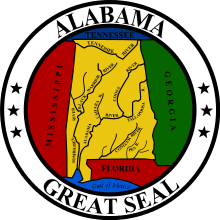Alabama Territory
| Territory of Alabama | |||||
| Organized incorporated territory of the United States | |||||
| |||||
|
Flag | |||||
 | |||||
| Capital | St. Stephens | ||||
| Government | Organized incorporated territory | ||||
| Governor | |||||
| • | 1817-1819 | William Wyatt Bibb | |||
| History | |||||
| • | Established | December 10, 1817 [1] 1817 | |||
| • | Statehood | December 14, 1819 [1] 1819 | |||
The Territory of Alabama (sometimes Alabama Territory) was an organized incorporated territory of the United States. The Alabama Territory was carved from the Mississippi Territory on August 15, 1817; lasting until December 14, 1819, when it was admitted to the Union as the twenty-second state.
History
The Alabama Territory[n] was designated by two interdependent Acts of Congress on March 1 and 3, 1817,[2][3] but it did not become effective until October 10, 1817.[1][4][5] The delay was due to a provision in the Congressional Act which stated that the act would take effect only if and when the western part of the Mississippi Territory were to form a state constitution and government on the road to statehood. A state constitution for Mississippi was adopted on August 15, 1817, elections were held in Sept., and the first legislative session convened in Oct.,[1] with the western part of the Mississippi Territory becoming the State of Mississippi on December 10, 1817.[6]
Location
Located in the central area of the Alabama Territory, St. Stephens, on the Tombigbee River, was the only territorial capital. William Wyatt Bibb was the only territorial governor.
On December 14, 1819, Alabama was admitted to the union as the 22nd U.S. state,[4][7] with Bibb becoming the first state governor (1819–1820).
Territorial evolution of Alabama
- Territories of Spain that would later become part of the Territory of Alabama:
- La Florida, 1565–1763
- Florida Occidental, 1783–1821
- Possession of Great Britain that would later become part of the Territory of Alabama:
- West Florida, 1763–1783
- U.S. states that ceded territorial claims that would later become part of the Territory of Alabama:
- State of South Carolina, 1787
- State of Georgia, 1802 (sold the Yazoo lands to the U.S.)
- U.S. territory with land that would later become part of the Territory of Alabama:
- Territory of Mississippi, 1798–1817
- U.S. state created from the Territory of Alabama:
- State of Alabama, December 14, 1819
See also
Notes
References
- 1 2 3 4 "An 1820 Claim to Congress: Alabama Territory: 1817"; The Intruders; TNGenNet Inc.; 2001; quick webpage: TN-537
- ↑ "An Act to enable the people of the western part of the Mississippi territory to form a constitution and state government, and for the admission of such state into the union, on an equal footing with the original state"
- ↑ "An Act to establish a separate territorial government for the eastern part of the Mississippi territory"
- 1 2 "Timeline 1811-1820" (events +sources); Algis Ratnikas; "Timelines of History"; 2007; webpage: TimeLine Miss
- ↑ "Statehood Dates"; 50states.com; 1998/2009; webpage: 50s-statehood
- ↑ "Resolution for the admission of the State of Mississippi into the Union"
- ↑ "Resolution declaring the admission of the state of Alabama into the Union"
- Williams, Lewis et al.; "An 1820 Claim to Congress: Alabama Territory : 1817." Op. cit.: Gales & Seaton; American State Papers';' Washington: 1834; retrieved 21 February 2010.
External links
Coordinates: 32°39′28.35″N 86°47′31.17″W / 32.6578750°N 86.7919917°W

